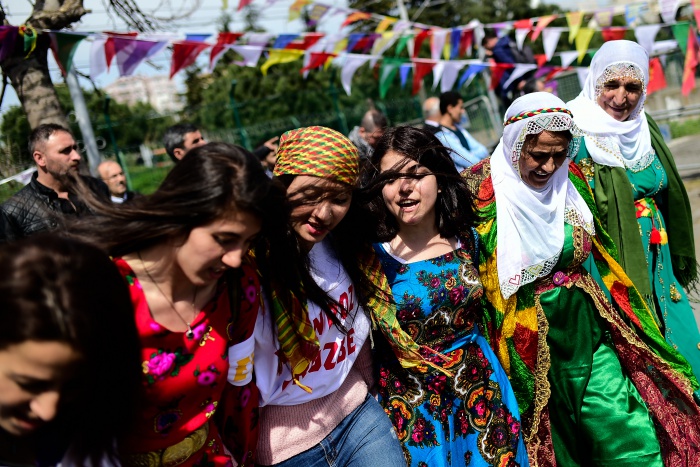[avatar user=”ABozkurt” size=”thumbnail” align=”left” link=”file” /]
Abdullah Bozkurt
Having deliberately undermined two initiatives to address Turkey’s longstanding Kurdish problem during its 16 years of rule, the government of President Recep Tayyip Erdoğan has neither the resolve nor the credibility to settle this issue.
Against the backdrop of recent rumors circulating in the Turkish capital of a plan to resume talks and make another attempt at solving the country’s most intricate problem, one cannot help but wonder how anyone is expected to trust a man who had derailed the 2009 and 2013 peace processes after seeing no political benefit coming out of them. The Kurds’ mistrust of Erdoğan has only deepened after seeing the Turkish president boasting publicly practically every day and listing the number of Kurdish militants killed in Turkey, neighboring Syria and Iraq at the hands of Turkish security forces and its allied militia, the Free Syrian Army.
The track record of the Erdoğan government suggests it has resorted to short-term tactical moves to cater to the Kurdish constituency when they seem suited to political wins, especially during elections, only to abruptly abandon them to compensate for losses from nationalist and Islamist backers that apparently outweigh the benefit of wooing the Kurds. The underlying challenges in addressing the Kurdish problem remain, while only minimal changes were introduced in the name of reform by the Erdoğan-led Justice and Development Party (AKP) government. The changes by and large were seen as cosmetic, while core issues such as local governance and use of the mother tongue have remained untouched during the reign of successive AKP governments.
But above all, Turkey’s troublesome deficit of democracy, which has prevented any real progress in resolving the Kurdish problem, has only expanded in recent years with an unprecedented crackdown on critics and opponents of the Erdoğan regime that included representatives of the legitimate Kurdish political movement. The jailing of pro-Kurdish Peoples’ Democratic Party (HDP) politicians including co-chairpersons, a number of lawmakers and hundreds of local elected officials and party members was part of a major persecution carried out by Erdoğan, who hammered all his critics by abusing the criminal justice system. His close alliance with the nationalists led by far-right politician Devlet Bahçeli and neo-nationalists led by Doğu Perinçek have only exacerbated Turkey’s complicated problems including the Kurdish one.
Even if one assumes that Erdoğan will re-launch Kurdish settlement talks after the June 24 snap polls following his expected victory, his motivations in choosing this path would remain the same. He wants to make Kurds into one of his constituent groups that make up his core support base, which is now heavily dominated by Islamists. Two road markers clearly reveal this caliph-wannabe man’s goals in this regard. One is Erdoğan’s blanket support for the Iranian-backed Turkish Hizbullah network in the predominantly Kurdish Southeast and alliance with its political wing, the Free Cause Party (Huda-Par). The other is the training of conservative and religious Kurds for enlistment in the Turkey-backed Syrian militia army against the US-backed Syrian Democratic Forces (SDF), mainly composed of Kurds linked to the outlawed Kurdistan Workers’ Party (PKK), which has waged a separatist war against Turkey for decades.
Complicating the Kurdish problem further for Turkey is Iran’s investment in Kurdish minority groups in the region for the purposes of creating another proxy faction to use against its regional rivals including Turkey. Erdoğan’s close ties to the mullah regime in Tehran that were well documented in a confidential investigation case file called Tevhid Selam have undermined Turkish institutions’ ability to respond to Iran’s malicious interest in Kurds. His open support for Iran’s nuclear arms program in defiance of traditional Turkish foreign policy shows how Erdoğan can go to extremes to lend a hand to the troubled Iranian regime. The Turkish president undermined Turkey’s own security needs at the expense of the Kurds’ plight by deepening cooperation with the Iranian regime in exchange for cash kickbacks to enrich himself and his family members. Turkish and US investigations that uncovered his links to sanction busting operatives of the Iranian government in 2013 and 2016 exposed Erdoğan’s clandestine dealings with the Islamic Revolutionary Guards Corps (IRGC).
If Erdoğan was sincere in addressing the Kurdish problem and had managed to resolve the issue, not only would Turkish interests have well served, troubles with NATO allies, especially the United States, would have been avoided as well. Yet that prospect will remain elusive as long as Erdoğan, Iran’s Trojan horse in the transatlantic alliance, keeps calling the shots in Turkey. Analysts who advocate the view that the US should broker a deal with the Erdoğan government in pushing Iran from Syria and increase the pressure on the Tehran regime have not really understood the character of the Erdoğan regime, which is infested with pro-Iran Turkish officials who were groomed for decades and fantasized about the Islamic revolution of the mullah regime.


